Brownsea Island
nr Poole, Dorset
|

Location Guide |
| A peaceful island of woodland, wetland and
heath with a wide variety of wildlife, famous for being the birthplace of
Scouting and Guiding, with Robert Baden-Powell holding the first experimental
Scout camp in 1907. Other historical activities include daffodil farming,
pottery works and acting as a decoy to protect Poole in the Second World War. It is the largest of five islands in Poole
harbour being 1.5 miles long by .75 miles wide, it comprises of a Scots and Maritime Pine woodland, two large acid
(freshwater) lakes, alder & sallow carr, freshwater reedbed and a 28 ha. saline
lagoon, saltmarsh, deciduous woodland and arboretum, a Henronry, an Open Air
Theatre and a castle. You can enjoy walks and spectacular views of Poole
Harbour, Studland, Old Harry Rocks and the Purbeck Hills. It is a haven for
wildlife, including red squirrels, peacocks and deer.
The Dorset Wildlife
Trust Nature Reserve
Is a 96.8 hectare
reserve occupying the northern half of the island and is leased by the Dorset
Wildlife Trust from the National Trust who own the island and manage the
southern half. It is a site of Special Scientific Interest, and included in the
Poole Harbour Ramsar Site and Special Protection Area.
Within this area is the
non-tidal Salt Water Lagoon, which is home to cormorants, oystercathcers,
blacked backed and black headed gulls, shulduck, mallard and Canada Geese all
year round. Grey Herons and Little Egrets from the Heronry also roost and feed
on it. Access is limited to certain times, but the area can be viewed from the
public hide by the main path leading from the quay.
Access to the Nature Reserve - July and August
one guided tour daily from 2pm to 3.45pm, March-June and Sept-October the
reserve is a self-guided nature trail, where you collect a trail guide leaflet
from the box on site. The reserve also has small charges for entry.
|
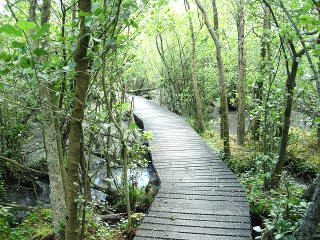
The Boardwalk leading to the reedbed in the
Nature Reserve
 Hugh
Venables
Hugh
Venables
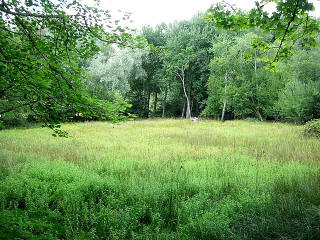
Meadow in Dorset Wildlife Trust Reserve
 Hugh
Venables
Hugh
Venables |
| The Islands Wildlife and it's Calendar
Red Squirrels, almost extinct in southern England, they are an important
part of Brownsea Island where there are no competing Grey Squirrels. They
are mostly active in spring and autumn around sunrise and sunset, when of
course visitors are not on the island. This island has a population of
around 200-250. They can be found in all the wooded areas of the island,
however they are shy and can be difficult to spot, particularly in hot
summer months when they will be resting.
As well as it's population of Red Squirrels
which are the highlight of the island it also has peacocks, Sikka deer which you
are more than likely to see. There are also many wildlife visitors to the
islands each year. The following is a typical guide to what might be seen on a
visit.
|
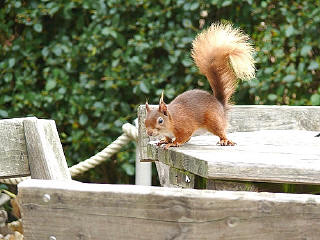
Red Squirrel on Brownsea
 lee adcock
lee adcock |
|
MARCH/APRIL |
AUGUST |
-
Red squirrels can be easy to see before the leaves of deciduous trees have
developed
-
Avocets, Black-tailed Godwits and other waders are still present before
they leave to nest elsewhere
-
Common and Sandwich Terns and Black-headed Gulls begin to pair up and
display
-
First Mallard ducklings appear
-
The Brimstone butterfly is on the wing on warm and sunny days.
|
- Wader migration will evident on the
lagoon with Little Stints and Curlew Sandpipers possible
- Red Squirrels can be difficult to see,
especially on busy and hot days
- Day-flying Cinnabar and Six-spot Burnet
moths are on the wing
|
| MAY |
SEPTEMBER/OCTOBER |
- Terns and Gulls begin to nest on the
lagoon.
- Reed Warblers and Water Rails are in the
reedbed.
- The Downy Emerald dragonfly (scarce
nationally) is on the wing on warm and sunny days.
|
- Avocets and Black-tailed Godwits will be
present in good numbers especially at high tide
- Red Squirrels can be easy to see as they
forage on the ground for fallen nuts, berries and fruits
- Late dragonflies like the Migrant Hawker
could be seen
- Many types of fungi on the woodland
floor
|
| JUNE/JULY |
|
- Common and Sandwich Terns and
Black-headed Gulls, feeding chicks on the lagoon.
- Up to 10 species of dragonfly and
damselfly on warm and sunny days
- Common Spotted and Marsh Orchids should
be flowering in damp areas around the lagoon and reedbed
- Butterflies include White Admirals,
Purple Hairstreaks and many others
|
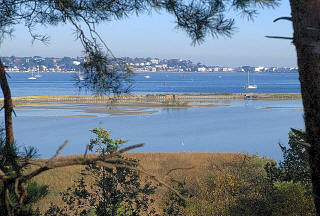
Saltwater Lagoon
 Peter
Land
Peter
Land
 |
| There are dedicated trails for young smugglers,
historians and explorers. Brownsea Castle is NOT open to the public.
Brownsea can only be reached by ferries from
Poole Quay, Sandbanks Jetty, Bournemouth Pier and Swanage Pier from March to
October. The ferries are privately owned and the ferry operators have their own
charges.
|
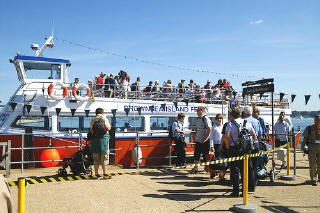
Brownsea Island Ferry
 Hyougushi
Hyougushi
 |
.
Planning Grid
|
Location: |
Brownsea Island, nr Poole, Dorset |
|
Grid Reference: |
SZ032878 |
|
Getting there: |
Can only be reached by ferries from Poole
Quay, Sandbanks Jetty, Bournemouth Pier and Swanage. Boats run half-hourly
from 10am |
|
Access: |
Enter the reserve along the boardwalk which
starts next to the public bird hide |
|
Parking: |
Poole Quay & Sandbanks |
|
Facilities: |
6 bird hides, boardwalks, shop, exhibition,
Toilets at Brownsea Quay & in The Villa, National Trust Café |
|
Things To Do,
See and Photograph: |
Red Squirrels, Sikka deer, birds of all types,
flowers, butterflies, dragonflies, damselflies, landscape and sea views,
walks |
|
What to take: |
Binoculars, long lenses, polarizer, |
|
Nature highlights: |
Red Squirrels, dragonflies, all sorts of water
birds, castle, lakes and more |
|
Address: |
Brownsea Island
Poole
Dorset |
|
Postcode: |
BH13 7EE |
|
Telephone: |
01202 707744 |
|
Opening times: |
March to October (exact dates alter each year) |
|
Charges: |
Adults: £4.90; Child: £2.40; Family: £12.20 |
|
Photo Restrictions: |
No commercial photography without permission |
|
Other Restrictions: |
|
|
Special Needs Access: |
Good, tracks are rough in places. Most of the
trail and three bird hides are accessible by wheelchair. Wheelchairs and
disabled visitors can be easily accommodated on the ferry boats. |
|
Special Needs Facilities: |
Toilets at the quay and visitor centre. Map of
accessible route for wheelchair users. |
|
Children Facilities: |
Baby changing facilities, pushchairs and baby
back-carriers admitted. Childrens guide book, quiz/trail, family activity
packs, all terrain baby buggies for loan |
|
Dogs Allowed: |
No Dogs
 |
|

|
Please let us know any other information that we
can add to the Further information and Planning Grids or page and any errors that you discover. Before making a long trip to any location it is always
wise to double check the current information, websites like magazines may be
correct at the time the information is written, but things change and it is of
course impossible to double check all entries on a regular basis. If you have
any good photographs that you feel would improve the illustration of this page
then please let us have copies. In referring to this page it is helpful if you
quote both the Page Ref and Topic or Section references from the Grid below. To print the
planning grid select it then right click and print the selected area.
Please submit information on locations you discover so
that this system continues to grow.
|